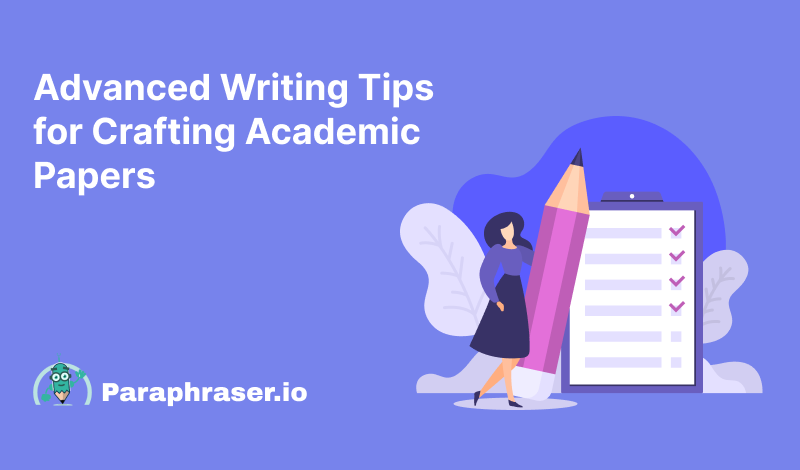
Advanced Writing Tips for Crafting Academic Papers
In academic writing, quality, clarity, concision, and details are essential. It is an important skill for both students and researchers working on a research paper, an essay, or a thesis.
This skill is beyond the basic views of grammar and punctuation. It includes advanced writing techniques, which makes it more engaging, informative, and impactful. However, learning academic writing can be challenging, especially if you are new.
In this blog, we will explore the strategies to improve academic writing and help to explain how to become a better academic writer. The main focus of these tips is to enhance the organization of thoughts and overall writing style. Read on if you want to know how to improve academic writing.
7 Effective Academic Writing Tips
Like any other skill, academic writing is improved with time. And if you want to make your paper strong and your research stand out, follow the writing tips given below.
Understand the Assignment
The first step of every writing process is to understand the instructions and requirements of the content. The same is the case for academic papers. Understanding the assignment ensures you stay focused on the topic and address the key points effectively.
Before writing the paper, carefully read the guidelines and highlight the specifications, such as formatting, word count, citation style, or document format. Underline any points that you are unclear about and seek assistance from your instructor. Allocate proper time to interpret the prospects of the assignment. Additionally, when working on your paper, consider how paraphrasing assignments with proper citation can enhance the originality and credibility of your work.
Conduct Thorough Research
An academic paper provides an in-depth analysis or evaluation of a topic. Therefore, it is essential to perform thorough research. Early research is helpful in avoiding any misconceptions about the topic. It helps to refine your topic, prepare your thesis statement, and provide relevant resources.
You can easily find the research topics online or in your institute’s library. Make sure to use only the credible one. For academic research, Google Scholar is the best resource. It will help to gather relevant material and evidence to support the main arguments.
Both primary and secondary sources of search can be utilized. Primary sources can be useful if you are writing a report or research paper. Secondary sources are reliable for case studies and interpretative papers.
When gathering the sources, you can extract the main points of the research resource by using the summarizer. The summarizer tool will skim the source into a short text which is easy to read. If that summary is relevant to your topic, you can give it a thorough read. This is a good approach as you can save a lot of time spent on reading all the resources in order to find the right one.
Write a Clear Thesis Statement
The thesis statement is a part of the introduction paragraph, and it is of great importance. A strong thesis statement is the foundation of your academic writing. It acts as a central theme of your paper to structure your essay and provide a coherent flow of ideas.
To write a good thesis statement, clearly state the primary argument or idea you will be presenting and guide the reader throughout your paper. Mentions all the important parts of the discussion without disclosing too much of the details.
Ensure that your thesis statement is concise and debatable. A good practice is to write at least five specific titles and then choose the best one. If you’re having trouble writing an accurate one, try to phrase your topic as a question and then answer it.
Develop a Proper Structure
In academic writing, building an orderly structure is essential to present ideas coherently and address all the issues. To become a better academic writer, you need to learn how to build a structure for writing papers.
To outline the pattern of the paper, make a list of all the subtopics that you need to cover. You can utilize the information gathered in the research phase. Categorize the information into subheadings and dedicate a single topic to each. To simplify the structure, break these headings into paragraphs. You can include your supporting evidence in the outline as well.
Typically, an academic essay consists of an introduction, main body, and conclusion. So, divide the body paragraphs into sections and include all the main points. Define the word count for each heading within the outline to get a better idea.
Write with Clarity
As you already know, an academic paper is concise, clear, and complete. So, always write in clear language and use proper terminologies to explain your arguments. The choice of words and tone matters a lot in academic writing help.
If you have followed the previous tips, you will have a concise thesis statement and a detailed outline. And these two can work as a guideline for writing. You just need to expand the outline and add details to each paragraph while connecting every point to the next one.
Most professionals start with a rough draft and then edit it to make it engaging and relevant. This could be done using the paraphrasing tool for creating engaging content. Just write your first draft and paraphrase it to improve the readability, enhance the sentence structure, and use the most suitable terminologies.
This tool is also helpful when you want to rephrase ideas from an online resource into your own words without plagiarizing. The paraphrase tool is a good option for academic writers as it enhances content quality & keeps your citations and references intact.
Add Citation and References
Citations set academic papers apart from normal writing. Citing the sources will not only validate the data written in any paper but also link it to the scientific community. This is why adding references and citations is emphasized.
To add citations accurately, check for the requirements in the assignment. The formatting style of the citation must be followed, consider using a citation generator tool for this. MLA and APA styles are most commonly used for research papers. You can utilize Zotero to keep the sources organized. If you are quoting someone, or paraphrasing the ideas into your own words, add references. It gives credit to the original author and enhances your credibility.
Citations and referencing are confusing at first because they require you to follow many rules. However, once you learn it, you will be able to cite your sources effortlessly. A complete bibliography or reference list is included at the end of the paper.
Proofread and Edit Thoroughly
Effective academic writing requires careful editing and proofreading to eliminate errors and improve clarity. So, after completing the writing process, review the paper to scan for any grammatical or spelling mistakes.
To start with, take a short break before revising your work. Proofread with a fresh mind to increase its impact. The first thing in proofreading is to ensure each paragraph contributes a meaningful argument.
Secondly, check for grammatical, spelling, and punctuation errors, and ensure your sentences are clear and concise. Pay attention to sentence structure, word choice, and paragraph transitions to enhance the overall readability of your paper. You can also use the Grammar Checker to automatically scan and rectify all the writing mistakes.
Proofreading and editing with the free grammar checker tool is preferred as it helps to identify and remove most of the errors in a short time. Lastly, check for plagiarism and rewrite paragraphs if required.
Last Words
Crafting a compelling academic paper requires more than just comprehensive research and developing strong arguments. It involves learning advanced writing techniques to enhance clarity, coherence, and cogency. The tips outlined in this blog post can help you elevate your academic writing if you want to become better at this skill. These strategies are effective for making your work stand out and contributing meaningfully to your field of study. Remember, academic writing is a skill that can be improved through practice and dedication.

